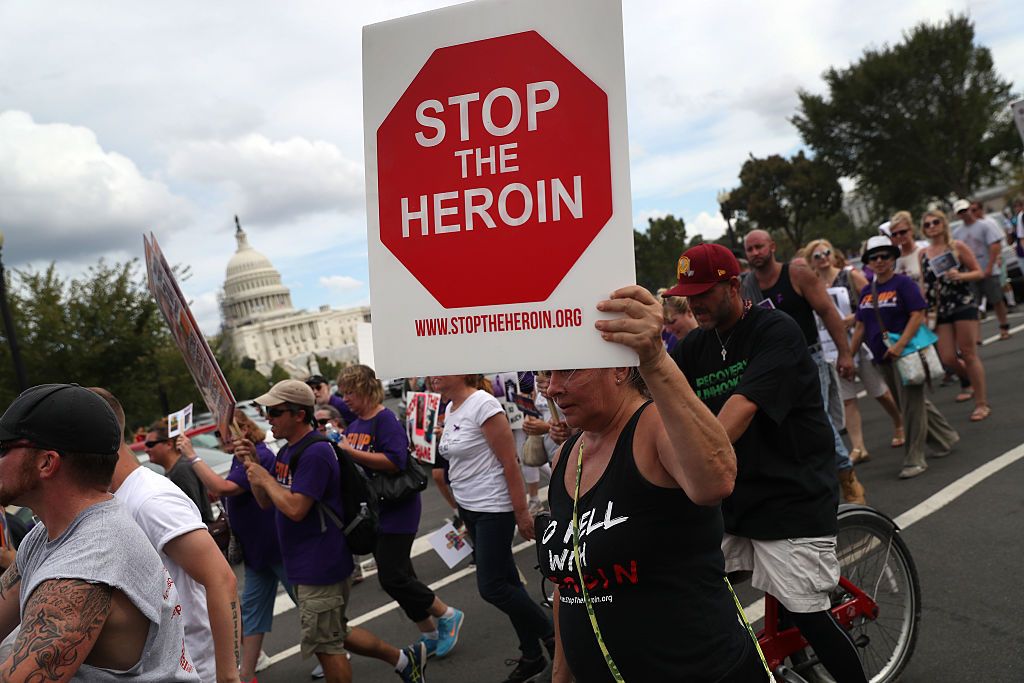
The opioid epidemic is claiming thousands of American lives on an annual basis, and it's also having a detrimental impact on the U.S. economy, according to a new study from Princeton University economist Alan Krueger.
The study found that a 20 percent drop in men's labor-force participation could be linked to an increase in opioid prescriptions between 1999 and 2015.
"Labor-force participation has fallen more in areas where relatively more opioid pain medication is prescribed, causing the problem of depressed labor-force participation and the opioid crisis to become intertwined," Krueger wrote.
In a 2016 study, he found that roughly half of prime-age men—between the ages of 25 and 54—who are not in the labor force take pain medication on a daily basis. On top of that, roughly two-thirds of these men take prescription pain medication on a daily basis.
Krueger does not believe this is a coincidence. His research shows that over the past 15 years, the labor participation rate fell in counties where more opioids were prescribed.
The labor participation rate pertains to the proportion of people either employed or looking for work. As the Brookings Institution notes, the labor participation rate in the U.S. has been declining for decades, and hit a near 40-year low of 62.4 percent in September 2015.
These days, the labor participation rate is roughly 63 percent. Among prime-age men, it has fallen from a peak of 98 percent in 1954 to 88 percent in the present day, according to the Council of Economic Advisers.
While Krueger's research shows the labor participation rate's decline can be attributed to such factors as an aging population, he believes the increase in opioid prescription rates has played a central role.
There's a lot of evidence that jobs are going unfilled in many parts of the country because people hooked to opioids can't pass drug tests or stay sober. Correspondingly, it's estimated that employers across the nation are losing $10 billion annually from absenteeism and lost productivity linked to opiod abuse.
Moreover, other economists have expressed views similar to Krueger's about the link between America's dwindling labor participation rate and the opioid crisis.
Speaking about the opioid epidemic during a Senate hearing in July, Federal Reserve Chairwoman Janet Yellen said, "I do think it is related to declining labor-force participation among prime-age workers. I don't know if it's causal or if it's a symptom of long-running economic maladies that have affected these communities and particularly affected workers who have seen their job opportunities decline."
The U.S. is "the only advanced nation that I know of where in these communities we're actually, especially among less educated men, seeing an increase in death rates partly reflecting opioid use," she continued.
Yellen has a point. According to the CDC, 91 Americans die from opioid overdoses every day. (In some places, the daily death toll as high as 142.)
In 2015 alone, the opioid crisis claimed over 30,000 lives.
We have reached a point where drug overdoses kill more Americans than HIV/AIDS did at its peak, and it's directly linked to the opioid epidemic. Drug overdoses are now the leading cause of death for people under 50 in the U.S.
In August, President Donald Trump publicly described the opioid crisis as a national emergency.
While acknowledging a problem is always a good start, the Trump administration has done little to address the opioid epidemic since that time.
Trump has yet to take the legal steps to formally declare the opioid crisis a national emergency (it requires a bit of paperwork), which means federal funds cannot yet be allocated toward thwarting this epidemic.
Newsweek reached out to the White House and the Department of Health and Human Services about this, but did not hear back by the time of publication.
Meanwhile, Trump has taken action on an issue that was central to his presidential campaign: immigration.
Earlier this week, the president moved to end the Deferred Action for Childhood Arrivals (DACA) program—the Obama-era program protecting young undocumented immigrants from deportation—and gave Congress six months to take action on the issue.
The DACA announcement was made by Attorney General Jeff Sessions, who justified the move in part by claiming that the program "denied jobs to hundreds of thousands of Americans by allowing those same illegal aliens to take those jobs."
The notion that undocumented immigrants "steal" jobs from Americans is frequently reiterated by politicians who favor a hawkish stance on immigration, but there isn't much evidence to support that assertion.
Instead, research shows undocumented immigrants tend to take low-skilled, physically demanding jobs most Americans don't want, which helps maintain the health and vitality of the labor market.
It is widely agreed upon by economists that immigration in general leads to economic growth.
If Congress doesn't take action in relation to Trump's DACA decision, roughly 800,000 people could be eligible for deportation. This could have major economic repercussions.
At the moment, roughly 91 percent of DACA recipients are employed and contribute positively to the U.S. economy (they pay roughly $2 billion in taxes every year). A January 2017 study from the Center of American Progress concluded that if all DACA workers were to lose their jobs, the cumulative U.S. gross domestic product (GDP) would be reduced by $433.4 billion over the next decade.
In short, Trump has made a decision on immigration that could have huge economic consequences, but has yet to take serious action on a drug crisis that claims thousands of lives a year and could be keeping a large portion of men out of the labor market.
Uncommon Knowledge
Newsweek is committed to challenging conventional wisdom and finding connections in the search for common ground.
Newsweek is committed to challenging conventional wisdom and finding connections in the search for common ground.





